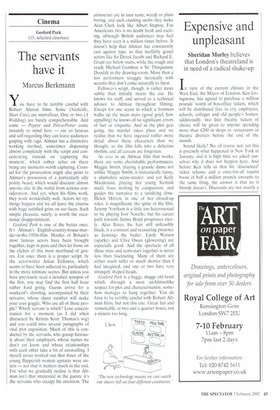Cinema
Gosford Park (15, selected cinemas)
The servants have it
Marcus Berkmann Cu have to be terribly careful with Robert Altman films, Some (Nashville, Short Cuts) are marvellous. One or two (A Wedding) are barely comprehensible. And some — Popeye and Pret-a-Porter come instantly to mind here — are so fatuous and self-regarding they can leave audiences gasping with rage. Altman has a distinctive working method, sometimes dispensing almost completely with the script and concentrating instead on 'capturing the moment', which rather relies on there being any moments worth capturing. Counsel for the prosecution might also point to Altman's possession of a particularly silly pointy beard, which would discount almost anyone else in the world from serious consideration. And yet, when his films work, they work wonderfully well. Actors let rip, things happen and we all leave the cinema with huge satisfied grins on our faces. Such simple pleasure, surely, is worth the occasional disappointment.
Gosford Park is one of the better ones. It's Altman's English-country-house-murder-in-the-1930s-film. Hordes of Britain's most famous actors have been brought together, kept in pens and then let loose on the cliches of this most moribund of genres. For once there is a proper script, by the actor/writer Julian Fellovves, which seems to have been adhered to, particularly in the more intimate scenes. But unless you have previously read a detailed synopsis of the film, you may find the first half hour rather hard going. Guests arrive for a weekend's shooting, accompanied by their servants, whose sheer number will make your eyes goggle. Who are all of these people? Which servant is which? Lose concentration for a moment (as I did when distracted by Kristin Scott Thomas's wig) and you could miss several paragraphs of vital plot exposition. Much of this is conducted by the servants, who gossip furiously about their employers, whose names we don't yet know and whose relationships with each other take a bit of unravelling. I myself never worked out that three of the young f1apperish women upstairs were sisters — not that it matters much in the end, For what we gradually realise is that Altman isn't that interested in the guests: it's the servants who occupy his attention. The aristocrats are in turn nasty, weedy or plain boring, and such crashing snobs they make Alan Clark look like Albert Steptoe. For Americans this is no doubt fresh and exciting, although British audiences may feel they have seen it a million times before. It doesn't help that Altman has consistently cast against type, so that ineffably grand actors like Sir Derek Jacobi and Richard E. Grant are below stairs, while the rough and ready Michael Garnbon is Sir Thingummy Doodah in the drawing-room. More than a few performers struggle heroically with accents that don't come naturally to them.
Fellowes's script, though, is rather more subtle than initially meets the ear. He knows his stuff, and served as a technical advisor to Altman throughout filming. Except for one scene in which a footman walks up the main stairs (good grief, how appalling) he knows of no significant errors of fact or etiquette. And as the plot gets going, the murder takes place and we realise that we have ingested rather more detail about these characters than we thought, so the film falls into a delicious rhythm, and all caveats are forgotten.
As ever in an Altman film that works, there are some cherishable performances. Maggie Smith, playing a Rrande dame not unlike Maggie Smith, is fantastically funny, a shameless scene-stealer; and yet Kelly Macdonald, playing her young Scottish maid, loses nothing by comparison, and guides the narrative to a satisfying close. Helen Mirren, in one of her closed-up roles, is magnificent, the spine of the film. Jeremy Northam is a little too heterosexual to be playing Ivor Novell°, but his career path towards James Bond progresses nicely. Alan Bates, his hair still unfeasibly black, is a constant and reassuring presence as Jennings the butler. Emily Watson (sparky) and Clive Owen (glowering) are especially good. And the spectacle of all these stars and semi-stars together is never less than fascinating. Many of them are either much taller or much shorter than I had imagined, and one or two have very strangely shaped heads.
Gosford Park is a baggy, shaggy old beast which, through a most unAltmanlikc respect for plot and characterisation, somehow manages to hang together. You do have to he terribly careful with Robert Altman films, but not this one. Great fun and remarkably, at two and a quarter hours, not a minute too long.






























































 Previous page
Previous page